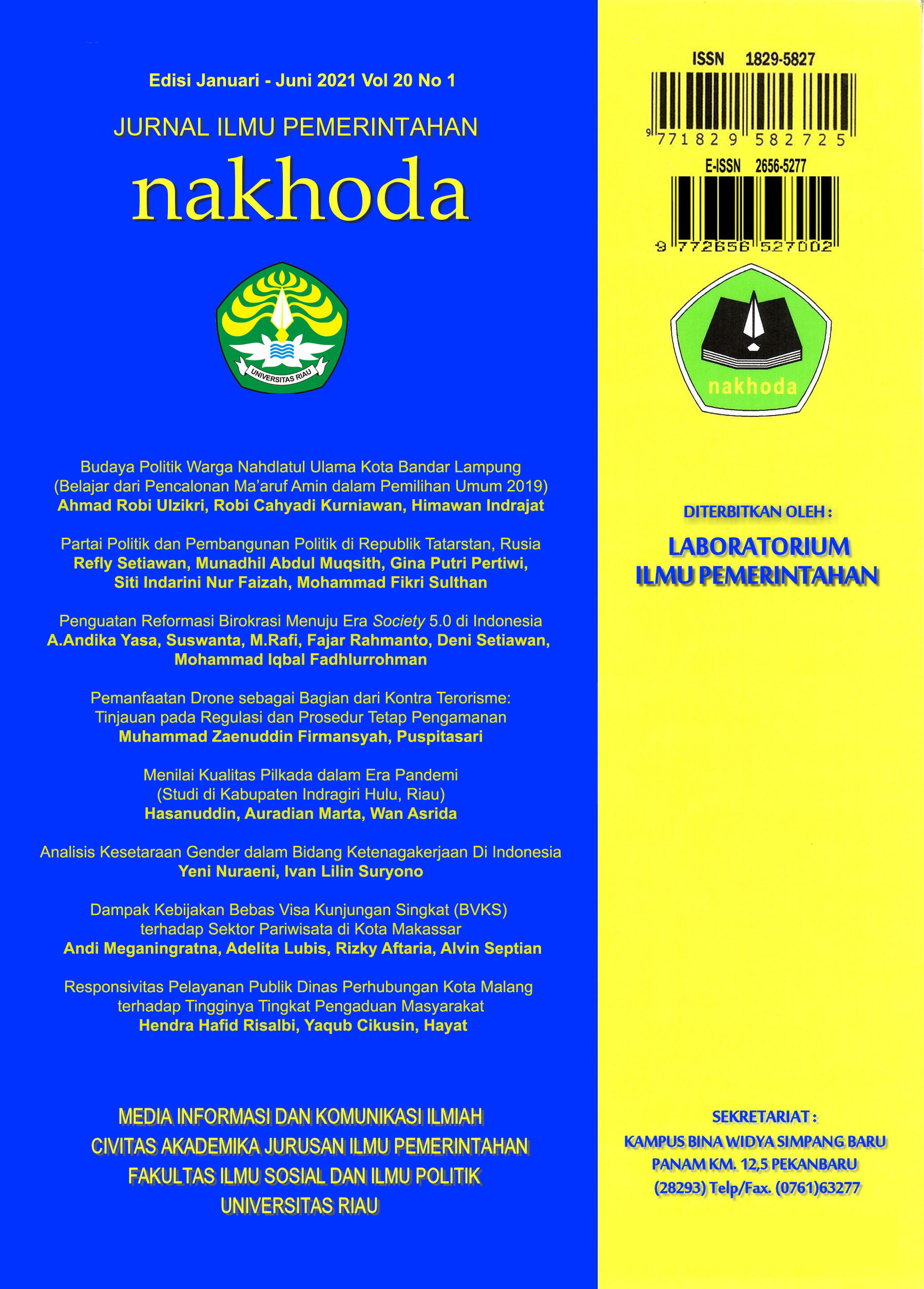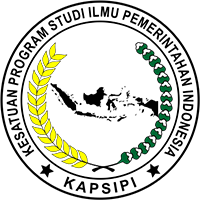Political Culture of Nahdlatul Ulama Citizens of Bandar Lampung
Learning from Ma'ruf Amin's Candidacy in the 2019 General Election
DOI:
https://doi.org/10.35967/njip.v20i1.108Keywords:
Preference, Orientation, Political Culture, Nahdlatul UlamaAbstract
This research is motivated by the involvement of the highest leadership (rais aam) of the Nahdlatul Ulama (PBNU) Executive Board Ma'ruf Amin who was appointed as a vice presidential candidate to accompany the incumbent Joko Widodo in the 2019 general election. Research problems arise when the public doubts the solidity between structural elements. NU and NU cultural elements (village kiai and Islamic boarding schools), including in Bandar Lampung. So, the purpose of this research is to find out how the political culture of the NU residents of Bandar Lampung city from the structural and Islamic boarding schools in the momentum of the Presidential and Vice Presidential Election in 2019. This research is analyzed using the political culture theory of Gabriel Almond and Sidney Verba. The combined research method with the model is concurrent embedded used in this study, which is a research method that combines qualitative and quantitative approaches where qualitative data is more dominant. The results of this study indicate that: first, the type of structural citizen political culture of NU is participant political culture, because it has cognition, affection, and evaluation of all aspects including the system as a general object, objects of input and output, and the person as an object in the system. in the context of the Presidential and Vice-Presidential Election in 2019. The second result, NU cultural residents from the kiai and Islamic boarding school students have a cultural type of transition from subject to participant, this is because this group has a good assessment of input objects, but still has a deficiency in individual participation. A number of factors that influence the political culture of both include the level of education, character, and values ??that guide both of them in their actions. The results of research with a political culture approach can be concluded that elements of structural NU and cultural NU in Bandar Lampung have solidity in winning the pair Joko Widodo and Ma'ruf Amin in the 2019 Election
Downloads
References
Adams, C., & Neef, A. (2019). Patrons of disaster: The role of political patronage in flood response in the Solomon Islands. World Development Perspectives, 15(July). https://doi.org/10.1016/j.wdp.2019.100128
Albintani, M. (2019). Politik Identitas dan Negara Bangsa di Riau. Nakhoda: Jurnal Ilmu Pemerintahan, 17(1), 1. https://doi.org/10.35967/jipn.v17i1.7054
Almond, G. A., & Sidney Verba. (1989). Civic culture. In Russian Culture at the Crossroads: Paradoxes of Postcommunist Consciousness (1st ed.). SAGE Publication Ltd.
Anugrah, I. P. (2021). The Residue of Military Regime During the Early Democratization Era in Indonesia and Myanmar. JCIC?: Jurnal CIC Lembaga Riset Dan Konsultan Sosial, 1(2), 72–79. https://doi.org/10.51486/jbo.v1i2.12
Baghdasaryan, M. (2017). The practice of political rights and patron–client relations: a case study of a party in Armenia. Citizenship Studies, 21(8), 1034–1051. https://doi.org/10.1080/13621025.2017.1380603
BPS Lampung. (2021). Hasil Sensus Penduduk 2020 di Provinsi Lampung. https://lampung.bps.go.id/
Budiardjo, M. (2017). Dasar-Dasar Ilmu Politik (Revisi). PT. Gramedia Pustaka Utama.
Burhani, A., & Simandjuntak, D. (2018). The Maruf Amin Vice Presidential Candidacy: Enticing or Splitting Conservative Vote. ISEAS: Yusof Ishak Institute Analyse Current Event, 51. https://doi.org/ISSN2335-6677
Damar, A. M. (2018). Ma’ruf Amin Jadi Cawapres Jokowi, Warganet Serukan #AlhamdullilahJOIN. Liputan6. https://www.liputan6.com/tekno/read/3614714/maruf-amin-jadi-cawapres-jokowi-warganet-serukan-alhamdullilahjoin#
Dolan, K., & Hansen, M. A. (2020). The Variable Nature of the Gender Gap in Political Knowledge. Journal of Women, Politics and Policy, 41(2), 127–143. https://doi.org/10.1080/1554477X.2020.1719000
Dwiastuti, R. (2017). Metode Penelitian Sosial Ekonomi Pertanian: Dilengkapi Pengenalan Metode Penelitian Kuantitatif, Kualitatif, dan Kombinasi Kuantitatif-kualitatif. Universitas Brawijaya Press.
Ellis, N. C. (2019). Essentials of a Theory of Language Cognition. Modern Language Journal, 103, 39–60. https://doi.org/10.1111/modl.12532
Farrugia, B. (2019). WASP (write a scientific paper): Sampling in qualitative research. Early Human Development, 133, 69–71. https://doi.org/10.1016/j.earlhumdev.2019.03.016
Fata, M. K. (2018). Membaca Polarisasi Santri dalam Kontestasi Pilpres 2019. Dinamika Penelitian: Media Komunikasi Penelitian Sosial Keagamaan, 18(2), 325–346.
Fox, N. J., & Alldred, P. (2018). Mixed methods, materialism and the micropolitics of the research-assemblage. International Journal of Social Research Methodology, 21(2), 191–204. https://doi.org/10.1080/13645579.2017.1350015
Goncing, N. (2015). Politik Nahdatul Ulama dan Orde Baru. The POLITICS?: Jurnal Magister Ilmu Politik Universitas Hasanuddin, 1(1), 61–74. http://journal.unhas.ac.id/index.php/politics/article/view/134
Harring, N., Jagers, S. C., & Matti, S. (2019). The significance of political culture, economic context and instrument type for climate policy support: a cross-national study. Climate Policy, 19(5), 636–650. https://doi.org/10.1080/14693062.2018.1547181
Haryanto, B., Ruldeviyani, Y., Rohman, F., Julius Dimas, T. N., Magdalena, R., & Muhamad Yasil, F. (2019). Facebook analysis of community sentiment on 2019 Indonesian presidential candidates from Facebook opinion data. Procedia Computer Science, 161, 715–722. https://doi.org/10.1016/j.procs.2019.11.175
Hasanuddin. (2018). Peran Partai Politik dalam Menggerakkan Partisipasi Politik Rakyat. Jurnal Ilmu Pemerintahan Nakhoda, 17(30), 94–100. https://doi.org/10.35967/jipn.v17i30.7062
Heywood, A. (2019). Politics. Macmillan International Higher Education/Red Globe Press.
Ivankova, N. V., & Plano Clark, V. L. (2018). Teaching mixed methods research: using a socio-ecological framework as a pedagogical approach for addressing the complexity of the field*. International Journal of Social Research Methodology, 21(4), 409–424. https://doi.org/10.1080/13645579.2018.1427604
Kagan, S., Hauerwaas, A., Holz, V., & Wedler, P. (2018). Culture in sustainable urban development: Practices and policies for spaces of possibility and institutional innovations. City, Culture and Society, 13(September), 32–45. https://doi.org/10.1016/j.ccs.2017.09.005
Kayane, Y. (2020). Understanding Sunni-Shi’a sectarianism in contemporary Indonesia: A different voice from Nahdlatul Ulama under pluralist leadership. Indonesia and the Malay World, 48(140), 78–96. https://doi.org/10.1080/13639811.2020.1675277
Kementerian Agama. (2019). STATISTIK DATA PONDOK PESANTREN. https://ditpdpontren.kemenag.go.id/pdpp/statistik?id=18
Khodijah, S., & Subekti, V. S. (2020). Dinamika Pembangunan Koalisi Partai Politik Pengusung Calon Tunggal Pemilihan Kepala Daerah Kabupaten Lebak Tahun 2018. Nakhoda: Jurnal Ilmu Pemerintahan, 19(2), 177–187. https://doi.org/10.35967/njip.v19i2.111
Lubis, H., & Rohmatillah, N. (2019). Komodifikasi Otoritas Komodifikasi Otoritas Kiai Di Kecamatan Pasean Kabupaten Pamekasan. 2(3), 57–64.
Menchik, J. (2019). Moderate Muslims and Democratic Breakdown in Indonesia. Asian Studies Review, 43(3), 415–433. https://doi.org/10.1080/10357823.2019.1627286
Muhammad, F. (2015). Dinamika Pemikiran dan Gerakan Politik Nahdlatul Ulama. Jurnal Studi Agama Dan Pemikiran Islam, 9(1), 57–76.
Mukhlis, M., Ulzikri, A. R., & Widianto, A. (2021). The Implementation Of nahdlatul Ulama’s Moderation Philosophy in Treathing Islamic Fundamentalism in Bandar lampung. Al-Tahrir: Jurnal Pemikiran Islam, 21, 1–34.
Olii, R. R. (2018). Pengaruh Tingkat Pendidikan Terhadap Partisipasi Politik Masyarakat di Kelurahan Tatura Utara Kecamatan Palu Selatan Pada Pilkada Kota Palu Tahun 2015. 6(1), 42–52.
Parjaman, T., & Akhmad, D. (2019). Pendekatan Penelitian Kombinasi?: Sebagai “ Jalan Tengah ” Atas Dikotomi Kuantitatif-Kualitatif. Moderat, 5(November), 530–548. https://jurnal.unigal.ac.id/index.php/moderat
Power, T. P. (2018). Jokowi’s authoritarian turn and Indonesia’s democratic decline. Bulletin of Indonesian Economic Studies, 54(3), 307–338. https://doi.org/10.1080/00074918.2018.1549918
Pratitaswari, A., & Wardani, S. B. E. (2020). Fenomena Broker Politik dalam Penyelenggara Pemilu. Nakhoda: Jurnal Ilmu Pemerintahan, 19(2), 217–228. https://doi.org/10.35967/njip.v19i2.106
Pulcu, E., & Browning, M. (2019). The Misestimation of Uncertainty in Affective Disorders. Trends in Cognitive Sciences, 23(10), 865–875. https://doi.org/10.1016/j.tics.2019.07.007
Simanjuntak, B., Antonius, & Sosrodiharjo, S. (2014). Metode Penelitian Sosial (Revisi).
Sugiyono. (2020). Metode Penelitian Kuantitatif, Kualitatif, dan Kombinasi (Mixed Methods) (Sutopo (ed.); Revisi). Alfabeta.
Suryo, H. (2015). Budaya Politik Negara Maju dan Negara Berkembang: Suatu Perbandingan. Transformasi, I(27), 1–47. https://ejurnal.unisri.ac.id/index.php/Transformasi/article/view/912
Tinov, M., & Handoko, T. (2016). Strategi Politik: Preferensi Partai Politik Menghadapi Pemilu di Aras Lokal. Nakhoda: Jurnal Ilmu Pemerintahan, 15(25), 53–64. https://doi.org/https://doi.org/10.35967/jipn.v15i25.3855
Tyson, A., & Purnomo, B. (2017). President Jokowi and the 2014 Obor Rakyat controversy in Indonesia. Critical Asian Studies, 49(1), 117–136. https://doi.org/10.1080/14672715.2016.1258585
Ulzikri, A. R. (2019). Politik Nahdlatul Ulama Dalam Pemilihan Presiden Dan Wakil Presiden 2019 (Studi Pada Warga Nahdlatul Ulama Kota Bandar Lampung) [Universitas Lampung]. In Digital Repository Universitas Lampung. http://digilib.unila.ac.id/56674/
Voinea, C. F. (2020). Political culture research: dilemmas and trends. Prologue to the special issue. Quality and Quantity, 54(2), 361–382. https://doi.org/10.1007/s11135-019-00943-0
Zainuddin, M. (2018). Partisipasi Politik: Kajian Rencana Pemekaran Kabupaten Mandau dari Kabupaten Bengkalis, Propinsi Riau. Nakhoda: Jurnal Ilmu Pemerintahan, 14(24). https://doi.org/https://doi.org/10.35967/jipn.v15i25.3855
Downloads
Published
How to Cite
Issue
Section
License
Copyright (c) 2021 Authos(s)

This work is licensed under a Creative Commons Attribution-NonCommercial-ShareAlike 4.0 International License.





